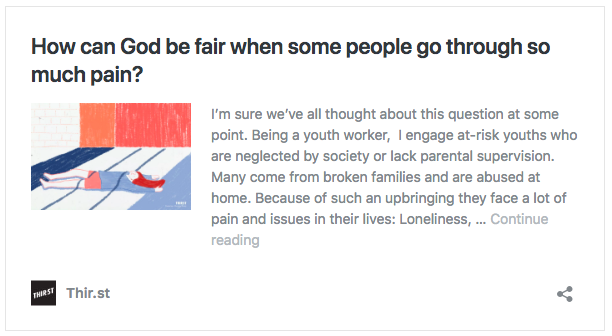A death of a loved one, a broken relationship, a stolen phone …
These are some examples of what many would term as “misfortune”. In today’s world, we are often optimistic to the point of delusion. We like to live and believe in the “gospel” of good times and good vibes. But in my experience, life is riddled with woes.
So, let’s agree to be honest here: Sometimes life just sucks. Now before we go any further, to put the rest of the article into perspective, it would first help to recall your most recent memory of heartbreak.

Let’s look at Genesis 50, where Israel passes away after finally arriving in Egypt – dramatically reunited with all his sons. There is much to be learnt from Joseph’s story, like how there is a time for mourning.
I’ve always found the mourning period unusually lengthy in the Bible. For example, when Israel died, the Egyptians (a people who barely knew him) mourned him for 70 days. Imagine going to your friend’s father’s funeral and attending it for 70 whole days.
But mourning wasn’t just an Egyptian thing. The Israelites, too, would wear sackcloth and mourn for their loved ones. This is recorded all throughout the Bible.
Let’s pause here and take a look at Ecclesiastes:
“For everything there is a season, and a time for every matter under heaven: a time to be born, and a time to die; a time to plant, and a time to pluck up what is planted; a time to kill, and a time to heal; a time to break down, and a time to build up; a time to weep, and a time to laugh; a time to mourn, and a time to dance…He has made everything beautiful in its time. Also, he has put eternity into man’s heart, yet so that he cannot find out what God has done from the beginning to the end.” (Ecclesiastes 3:1-11)
Solomon, wisest man in the world, plainly laid out the framework of God’s times and seasons in life. God has ordained every season in every individual life and He calls them beautiful.
To err is human, to forgive is divine.
– Alexander Pope
So if God calls a mourning season in my life “beautiful” – who am I to say otherwise? I can only believe that there is beauty in brokenness and purpose in pain. Likewise, this idea wasn’t foreign to Paul.
“So we do not lose heart. Though our outer self is wasting away, our inner self is being renewed day by day. For this light momentary affliction is preparing for us an eternal weight of glory beyond all comparison, as we look not to the things that are seen but to the things that are unseen. For the things that are seen are transient, but the things that are unseen are eternal.” (2 Corinthians 4:16-18)
I don’t know how much pain you’re going through in this season of your life. But I do know that it’s all about perspective. Maybe some of you out there are feeling a lot of pity for yourself because of the state that you are in. But do you know you can feel the most excruciating pain in the world and still be the most joyful person?
What is your perspective? It’s not all about us.

“I rejoiced in the Lord greatly that now at length you have revived your concern for me. You were indeed concerned for me, but you had no opportunity. Not that I am speaking of being in need, for I have learned in whatever situation I am to be content. I know how to be brought low, and I know how to abound. In any and every circumstance, I have learned the secret of facing plenty and hunger, abundance and need. I can do all things through him who strengthens me.” (Philippians 4:10-13)
Going back to Genesis, Joseph was approached by his brothers who were afraid that Joseph might take revenge on them after their father died. They started with deception – using their late father’s authority to command Joseph to forgive them.
God can use every painful situation to change and transform us if we are humble enough to trust Him.
But when I read Joseph’s response, I almost fell out of my chair.
“But Joseph said to them, ‘Don’t be afraid. Am I in the place of God? You intended to harm me, but God intended it for good to accomplish what is now being done, the saving of many lives. So then, don’t be afraid. I will provide for you and your children.’ And he reassured them and spoke kindly to them.” (Genesis 50:19-21)
Alexander Pope once said, “To err is human, to forgive is divine.” How could Joseph forgive his brothers and respond so compassionately if not for God? His attitude towards life was a divine one despite the great pains of his life. He saw the beauty in brokenness and the purpose in pain.
While it is true that free will exists, and all pain in the world is the reality of sin outside of the will of God, God can use every painful situation to change and transform us if we are humble enough to trust Him.
He promises us that He will be especially near when we bring the broken pieces of our hearts back to Him (Psalm 34:18). He keeps our tears in a bottle (Psalm 56:8) and is the God of all comfort in our pain (2 Corinthians 1:3).










